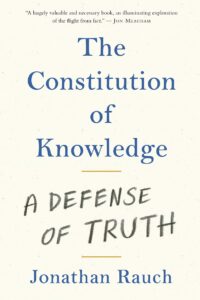by Jonathan Rauch
Because I’m a librarian, a journalist and a college faculty member, you may think it wasn’t much of a lift for author Jonathan Rauch to sell me on his Constitution of Knowledge, a framework for harnessing truth in an age of mistrust and uncertainty.

Rauch reminds readers repeatedly that truth isn’t what I think, or what you think. Truth is what we think, a fragile consensus based on current evidence and always subject to revision. Nonetheless, on any given day, the time-tested network of truth-seeking institutions still serves as a footing in reality. What a relief.
In our search for truth, Rauch urges us not to be disoriented by the right’s disinformation campaigns or cowed by the left’s cancel-culture insistence on thought conformity. Instead, he proposes two simple rules.
Seeded by Socrates and flowering in the 18th century, fallibilism is the principle that we must accept as knowledge even that which can’t be proven. After all, it is impossible to prove much of anything. Therefore, the truth-seeking community accepts a prevailing hypothesis only until a better one comes along. Rule No. 1: No final say.
Rauch traces the rapid progress that followed adoption of the fallibilist system, which would have been impossible without Rule No. 2: No personal authority.
According to Rauch’s constitution, anyone can present their ideas, no matter how whacky, without fear of persecution. Not the professor, nor the president, nor the pope decrees what is true. But neither are members of any historically persecuted group automatically granted the final word. Everyone must defend their truths from a gauntlet of critics and nay-sayers. This is a messy, mercurial business, but it is the necessary business of democratically sifting a sandstorm to capture a few grains of truth.
So which of society’s beleaguered institutions make up the truth-seeking network? Judges, journalists, teachers, scientists and elected government officials are (or should be) collectively committed to an objective search for truth. “Figures,” you might quibble: same old cast of despised, often-discredited elites and intellectuals.
Rauch argues that this system is the only one that is, in theory, open to all. It enshrines each citizen’s right to posit and defend their thoughts, possibly even claim the contested high ground of knowledge.
It is an imperfect system, rife with human failings, but the Constitution of Knowledge establishes rules of civility, checks and balances and connections across network institutions. It harnesses the brilliance or self-serving ambition of individuals to propel society’s understanding forward.
Rauch’s latest book won’t be much help to those who, for whatever reason, want to pin his constitution to one political camp or another. He is a senior fellow in governance studies at the Brookings Institute, which published his latest book this year.
According to Wikipedia (an esteemed part of the truth-seeking network, according to Rauch) Brookings has been described by various media organizations as “centrist,” “liberal,” or “right-wing.” The book’s acknowledgements section thanks contributors including the libertarian Charles Koch Foundation, the liberal William and Flora Hewlett Foundation, and the conservative American Enterprise Institute.
Rauch honed his powers of persuasion as an outspoken warrior in the fight for gay rights and same-sex marriage. Still, his current romp from ancient philosophy through the 2020 presidential election might sound like as much fun as skipping across hot coals. But Rauch’s long experience as a journalist and author makes his thoroughly researched, often witty, writing not only thought-provoking and accessible—but ultimately reassuring.
Margaret Thomas is a librarian and journalism instructor at South Puget Sound Community College.

The definition of truth is closer to “that which has happened” and not an interpretation of what happened. For example, a car accident is seen by 9 witnesses who all have a different interpretation of exactly what happened but in reality only one thing happened.
The idea that there is no such thing as truth is extremely critical. Solipsism is the idea that it is not possible to know the truth, which is basically saying there is no truth. So if there is no truth, then we can decide for ourselves “what the truth is” either individually or as an agreement.
This is how how Satanists can justify the killing of children by stating that the truth is “it’s okay to kill children under certain circumstances” like during a ritual. The problem is that there are universal truths that do not in any way depend on a person having a point of view. These universal truths are called Natural Law.
For an important and detailed investigation into Natural Law watch this easy to understand video from Mark Passio:
http://www.youtube.com/watch?v=ASUHN3gNxWo&t=17s